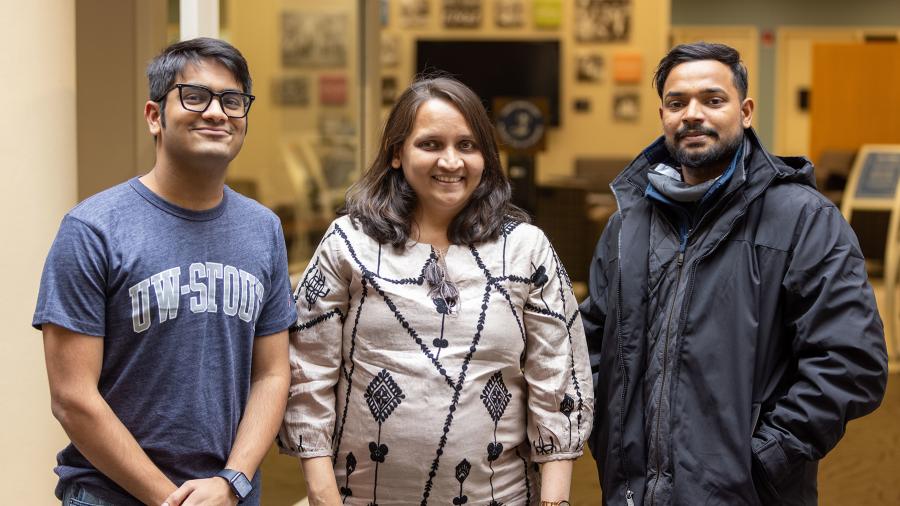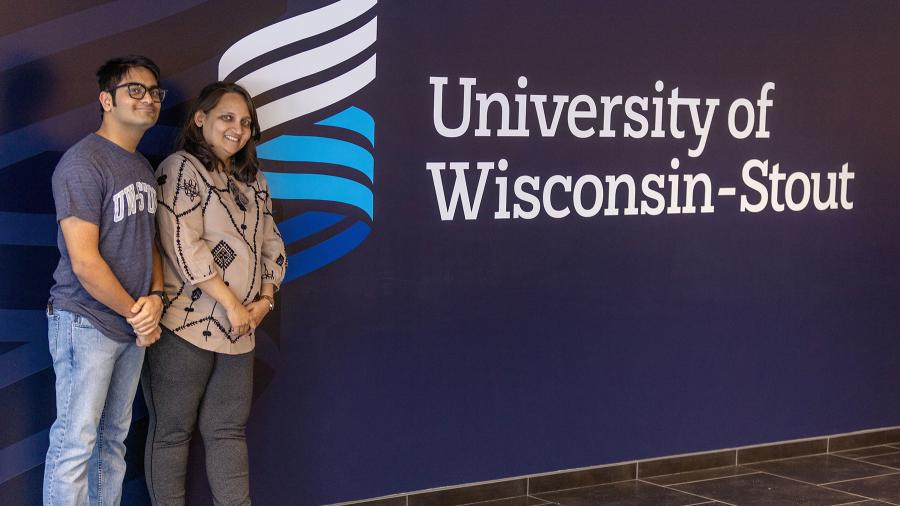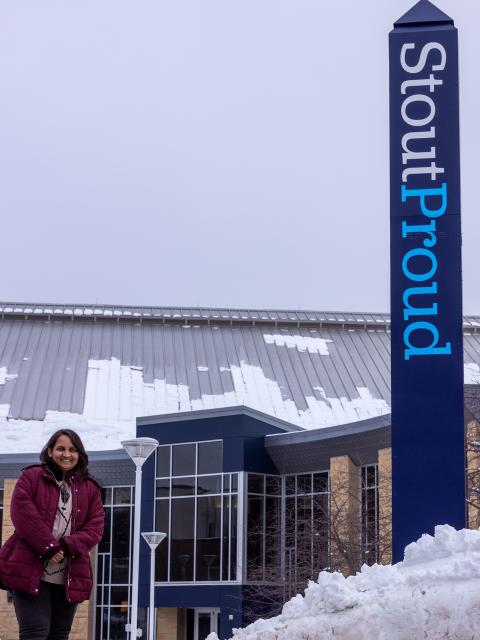
Student recruiter Anagha Pednekar, center, meets with two students from India, Vini Tapadiya, left, and Kiran Mane during her visit to UW-Stout. / UW-Stout
New in-country recruiter Pednekar impressed with labs, campus, friendliness during weeklong visit
Whether in Mumbai, New Delhi or any other city across the vast nation of India, Anagha Pednekar could have a distinct advantage when it comes to recruiting students for UW-Stout.
It’s the polytechnic advantage, the applied learning and career-focused higher education that sets UW-Stout apart in the UW System — a type of education virtually unheard of in India.
Pednekar is a new in-country recruiter for UW-Stout in India who saw the polytechnic approach firsthand recently during a weeklong visit. She arrived with 25 students from India who were starting the spring semester with an orientation. She also visited classrooms and labs, met staff and attended a basketball game.
Student recruiter Anagha Pednekar, center, meets with two students from India, Vini Tapadiya, left, and Kiran Mane during her visit to UW-Stout.
Student recruiter Anagha Pednekar, center, meets with two students from India, Vini Tapadiya, left, and Kiran Mane during her visit to UW-Stout. / UW-Stout
“The labs are very important from a recruiting perspective,” Pednekar said, adding that most Indian students she speaks with are intrigued about the different learning style based around hands-on activities.
The instructional style in India is “pretty rigid,” she said. “Polytechnic is a completely different concept. In India, students are not workforce ready. They may have the knowledge but lack skills.”
The instructor to student ratio in India is 50 to 1. At UW-Stout it’s about 20 to 1, providing students greater opportunities for individual attention and to interact with their professors and classmates.
Pednekar is employed by Worldwide EduConnect, a company that partners with North American higher education institutions and specializes in managing in-country representatives.

Pednekar is recruiting students from India, such as Vini Tapadiya, left, to attend UW-Stout. / UW-Stout
Representing solely UW-Stout in such a vast region, Pednekar partners with a variety of constituents to yield success, including but not limited to agencies, public and private high schools and higher education institutions; and EducationUSA Offices, the U.S. State Department’s educational outreach arm.
Increased student interest from India
In September, Scott Pierson, Office of International Education director, and Chancellor Katherine Frank visited India as part of the U.S. Commercial Service Education Trade Mission and met with government officials, higher education institution representatives and groups of prospective students.
In addition to witnessing firsthand student demand for the polytechnic approach, Pierson shared that higher educational institutions are equally excited about the prospect of degree pathway programs with UW-Stout that would provide unique opportunities for students to integrate theory with practice.
Pednekar was impressed with other aspects of the university that she plans to promote: The friendliness of students, faculty, and staff; and the safe and friendly, small-town atmosphere.
Most students from India come from large cities, such as Mumbai, population 23 million, where Pednekar lives. University campuses there are very compact, she said.

Pednekar’s visit to campus was her first. She arrived with a group of students, went through orientation with them, toured campus and met faculty and staff. / UW-Stout
“This is a really friendly place. Coming from cities with millions of people to a city of 16,000, students want to have that different experience,” she said, noting that few of them are interested in online programs but want to study in the U.S.
“It’s a value proposition – good programs, high employment rate of graduates and a safe community,” Pednekar said, noting UW-Stout’s 98.4% employment rate of recent graduates.
While in India, Pierson established working relationships with several institutions as part of UW-Stout’s renewed efforts and growing opportunities to recruit in the region post-pandemic. Higher education reforms in India, including more flexibility in transferring credits and degree completion agreements paired with pent-up pandemic-related demand have resulted in significant increases in Indian students vying to study in the U.S.
During this past year, India assumed the top-sending nation ranking for study in the U.S.
“It’s the right time to really concentrate efforts in India,” said Pierson, who recently was named a Fellow in the U.S.-ASEAN University Connections Initiative, a White House initiative designed to foster stronger higher education relations with eight southeast Asian countries.
India is the world’s second most populous country with about 1.4 billion people.
This semester, more than 40 students from India are at UW-Stout, six times more than a year ago. Of the 40 students, 14 new admits are in the food science master’s and bachelor’s programs.
Other STEM-designated programs that have drawn interest include the applied mathematics and data science master’s; applied mathematics and computer science bachelor’s; operations and supply management master’s; applied psychology master’s; and risk control and safety management master’s.
Indian students have also expressed interest in many of UW-Stout’s award-winning, top-ranked art and design, engineering, and hospitality programs.
New student enjoying UW-Stout experience
Most students from India will stay in the U.S. for the duration of their degree program, undergraduate or master’s, Pednekar said, not just for a semester or year. Also, most hope to find jobs in the U.S. after graduating.
U.S. nonimmigrant visa regulations permit students to work in their respective field for one to three years post-completion of their degree without needing employer sponsorship.
Vini Tapadiya, also of Mumbai, is a first-year student who arrived last fall. He chose UW-Stout because, “I liked the whole vibe and it had my program,” he said, as he led Pednekar on a tour of campus.
He is majoring in supply chain management, which he said many U.S. universities don’t offer, and plans a double major in business administration. He received a scholarship and is happy with his university choice.
“I’ve made friends here. I’ve already adapted to the weather pretty well. The campus is cozy and everything is centralized,” he said.
“Menomonie is big enough and small enough at the same time,” Tapadiya said. “I’m Stout Proud.”
On average UW-Stout annually welcomes more than 180 international students from more than 40 countries who seek degrees or participate in exchange programs. Approximately 200 domestic UW-Stout students take part in international and domestic study away programs.
Written by Jerry Poling
Link to original story: https://www.uwstout.edu/about-us/news-center/advantage-uw-stout-polytechnic-approach-could-boost-recruiting-efforts-india
